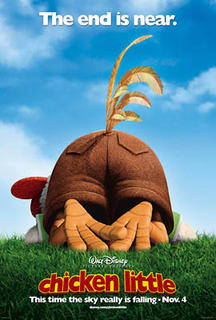
Dumb Mistake Number One that Smart People Make: Chicken Little Syndrome
When something falls on the head of Chicken Little, the infamous piece of poultry assumes that the sky is falling, and that all in the world are doomed.
Also referred to as "catastophizing" or "awfulizing" (by Albert Ellis), the Chicken Little Syndrome leads people to jump to conclusions about the awful-ness of circumstances, and even create worst-case scenarios for themselves. Pessimism instead of optimism. It's the "sinking feeling" that one gets when your boss announces that s/he wants to talk to you in 20 minutes. Do you spend the next 20 minutes excited about the possibilities, or terrorized by worry about all the mistakes you've made, and the horrible consequences that could result?
Unfrotunately, these catastrophisizing thoughts can actually make things worse - and in some cases even CAUSE the catastrophic events that we fear most. As stated in the book, The Ten Dumbest Mistakes Smart People Make and How to Avoid Them, thinking the worst can actually bring about the disaster you fear - and it can happen in very subtle ways, and in just a matter of seconds.
One example is that of Mark, who is preparing to deliver a speech to his colleagues. Even as he approaches the microphone, instead of focusing on the content of his speech, Mark is awfulizing. The horrible scene flies through his mind:
What if the microphone won't work? I'll get upset and lose my place. I'll stutter. Then I'll get the whole thing messed up. Everyone will laugh at me. That will make my boss furious. I can forget about any kind of promotion. I'll be lucky if I keep my job. This speech could destroy me."
In a matter of seconds, Mark has written a "script for disaster." By the time he opens his mouth, he is convinced that his job is on the line. How well can one perform under that kind of self-imposed pressure?
The authors do point out, however, that avoiding those awfulizing thoughts, and instead thinking REALISTICALLY, does not mean cheerfully assuming that nothing bad will ever happen, and that everything will always be okay. It does mean challenging the realism of your awfulizing thoughts, preparing for what you CAN prepare for, and then catching yourself when you fall into the trap of writing a script for disaster before you've even started.
Like Chicken Little, instead of asking "Gee, I wonder what hit me on the head? It may be a small piece of sky. Perhaps I should gather more information and perhaps consult with an expert?" we all too often jump to grand conclusions based on a small piece of evidence, exaggerate the importance or awful-ness of it, and get ourselves all worked up into a panic.
So what can we do about it? Challenge Those Negative, Pessimistic, Catastrophizing Thoughts!
Authors Freeman and DeWolf suggest DE-Catastrophizing. Becoming aware of Chicken-Little thoughts and challenging the truthfulness of those fears. For Mark, in the example above, he could ask "Is this speech really the death of me? My career?" "Have I made this too important? Am I jumping to conslusions? Am I assuming that the sky is falling?"
What are your automatic self-destructive awfulizing thoughts? What are the common paths to Chicken Littledom?
- The Path of Global Effect. Sounds like (and I'm paraphrasing): "That sucked. I didn't do that well at all. I suck. I don't do anything well." This happens when we take a small incident, and assign global truths to it. Taking a single unpleasant event, and making generalized assumptions about how it applies to all future similar events.
- The Path of Generalization. Sounds like, "That didn't work. It will never work. I asked 2 women/men out on dates. They both said no. Women/men just don't like me. I'll never find someone to love me." From Shakespeare's Julius Caesar, "A coward dies many times before his death." We fail once, and imagine a million failures therafter; most unrealitic.
- The Path of Imitation, also known as "The Turkey Lurkey Effect." Adopting the conclusions of others, without questioning, disputing, or challenging their reality.
- The Path of Magnification. Assuming that a small event or mistake will have insurmountable consequences. Hyponchondriasis. A boss's sincerely productive feedback. Making a mountain out of a molehill.
LIFE COACHING Exercise / Assignment for the Day: Practice "catching" those assumptions you make, the generalizations you make, and the awfulizing and catastrophizing thoughts, and challenge them. Refuse to automatically adopt a pessimistic and over-blown reaction to your situation.
And then let me know how it goes.
2 comments:
Yes it's true - it all depends how we look at the situation! Let's take parents complaining about their teens. They are convinced that teenagers are "from another planet" and conflict is an everyday occurrence.
Well, you are wrong! You can have a great relationship with your teenager - I have.
Quite frankly, if I hear "I cannot wait until my teen moves out" one more time, I will blow my top.
You can end the arguing; you can have a really great relationship with your teen. Do something - you owe it to yourself as well as your child.
Christina Botto
Parenting your teenager doesn't have to be frustrating!
Parenting A Teenager
This is a great post. I totally agree that how we view things often determines how they will turn out. The post really brought to home that we need to focus on what is possible instead of making everything into a problem. I appreciate that the post was researched and provided great references.
Post a Comment